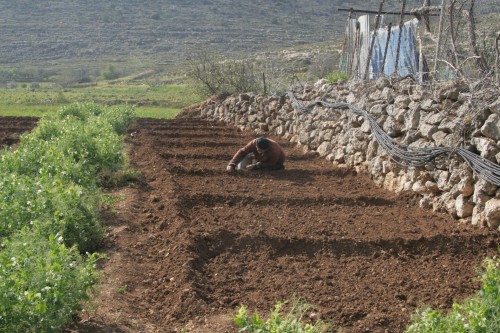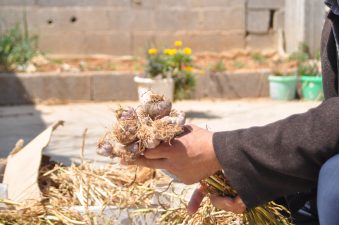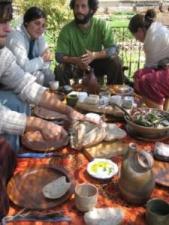
(Abu Ibrahim, 53, in a field of fava beans. Photo: Daniella Cheslow)
One of the most compelling parts of the West Bank is its Biblical landscape, shaped by the small villages and terraced farm plots that dot the rolling hillsides.
Yesterday, I saw that landscape up close on a visit to Wadi Fuqin (Valley of Thorns) a village of about 1,200 southwest of Jerusalem nestled in a valley under the brow of the apartment blocks of the neighboring Beitar Illit settlement. The 100 village farmers use old and new techniques to raise chemical-free vegetables for themselves, for Bethlehemites and for idealistic Jewish residents of neighboring Tzur Hadassah, Jerusalem and Tel Aviv through the EcoBaladi Web site.
Haaretz writer Ronit Vered recently waxed poetic about Wadi Fuqin here.
My host was Abu Ibrahim, 53, a school teacher who helps his 73-year-old father farm about 5 dunams (1.25 acres) on the valley floor. Abu Ibrahim has a wife and eight children. He speaks some English and bits and pieces of Hebrew. I got in touch with him through an Israeli woman who had ordered vegetables from him.
Olive trees in Wadi Fuqin’s fields; Beitar Illit in the distance (all photos by Daniella Cheslow).
Getting to the valley requires either a private car, in which you can ride from Jerusalem out towards Gush Etziyon and Beitar Illit, or you can take a Palestinian bus from Jerusalem to either Bethlehem or Gilo Junction and from there, take a cab.
The village is small enough that on the ride in, my cab driver simply asked people where Abu Ibrahim lived. When we couldn’t find his house, the driver asked a village boy to jump in the car and help us out, and he happily obliged.
The homes in the built-up area of the village ascended a steep incline traversed by risky asphalt roads. The farmland, all in the flatter valley, was divided into tiny patches; green wheat grew on one and knee-high cabbages bloomed on a miniscule square.
The bright green tendrils of snow peas sprang up between the cabbages and the onions. Further afield were fava beans, and at the edge of another small square were the tall leaves of the beetroot. Olive and almond trees were mainly on the edges of the farmland.
I was interested in seeing the traditional ways of farming being used in the fields; while some plots were traversed by black drip irrigation pipes, others were dug to take advantage of the lay of the land. For example, there was a square, full water reservoir in the fields. At its base was a channel dug of earth. Water from the reservoir flows into the channel and onto the patch of cabbages.
A little lower on the hill was a chain of square dirt plots separated by raised lines of earth; Abu Ibrahim said that as the top square fills with water, he breaks the barrier to let the water flow to the next one.
The water reservoir; water flows out the hole at the bottom and down the earthen channel to the fields below.
Abu Ibrahim’s father, 73, planting onions in the beds that descend the hillside. Planting this way helps direct water from plot to plot, downhill.
Abu Ibrahim said that because the crops are first grown for local consumption, the farmers are careful not to use chemicals. He said this helps him command a premium in Bethlehem markets, and among Israelis. At the same time, there was a bottle of Spanish weed killer resting between the plots; he said that helped get rid of the weeds that grow so high that it is impossible to plow with his donkey.
Abu Ibrahim picking lemons from his backyard tree.
At his own home, Abu Ibrahim grows vegetables in a greenhouse and lemons on a few trees in the backyard. Under his and his family’s homes are a chicken coop; he said the chickens sleep indoors at night and peck around the backyard during the day. In another pen, goats and sheep bleated.
One of Abu Ibrahim’s sheep.
Wadi Fuqin’s future is unsure. As I learned when I visited last year, the village is wedged between the Green Line on one side and Beitar Illit on the other. The villagers claim that sewage from Beitar Illit is contaminating the eleven springs that historically have provided for local water needs. The prospect of the security barrier being built is a constant presence; the Green Line runs right through the valley.

Map of the area. Wadi Fuqin is southwest of Jerusalem, the brown smudge just north of the blue area of Beitar Illit. Map taken from Btselem.org.
If you are interested in ordering vegetables from Wadi Fuqin, check out www.EcoBaladi.com.









4 thoughts on “EcoBaladi Sprouts Organic Vegetables From the West Bank Valley of Thorns (Wadi Fuqin)”
Comments are closed.